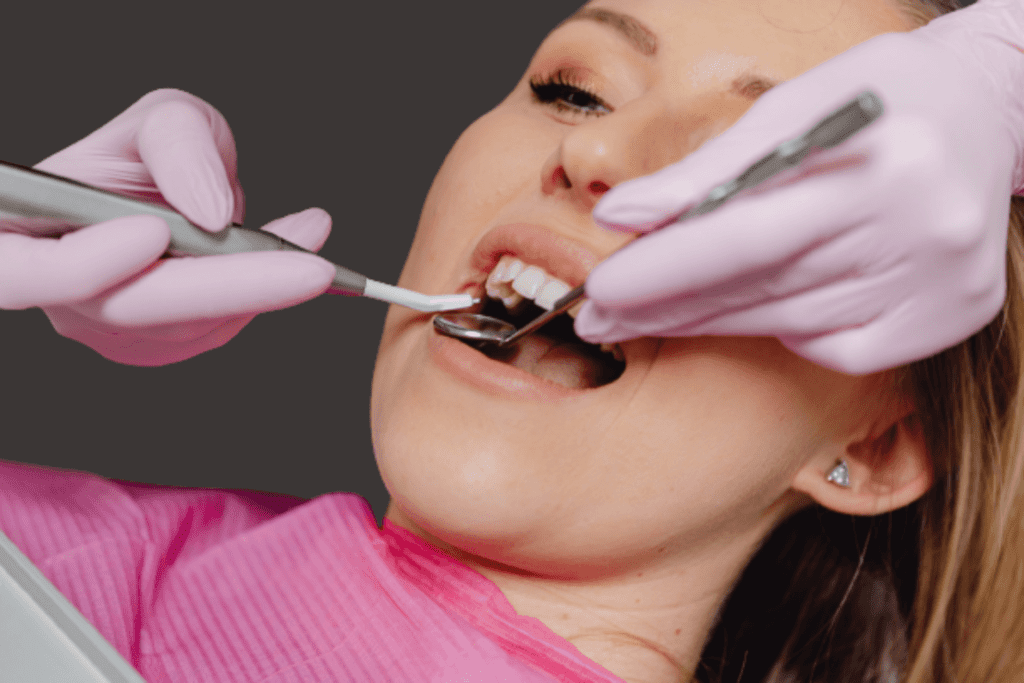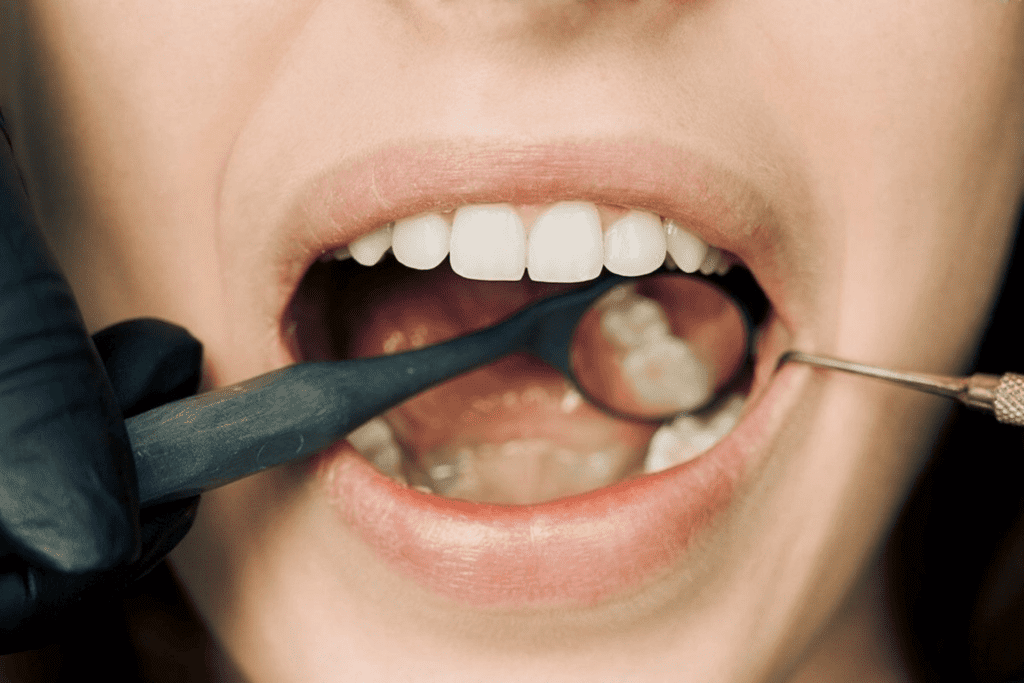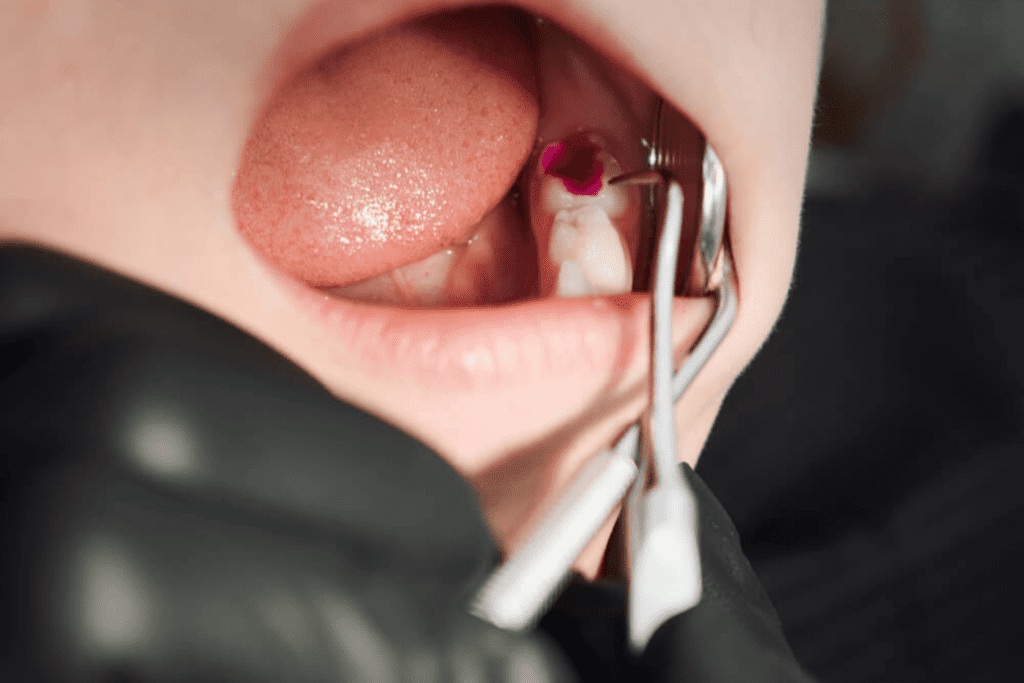A bruxism mouthguard is a specialized dental appliance used to manage the effects of bruxism, a condition characterized by teeth grinding or clenching. This custom-fitted guard is typically made from soft or hard materials and is worn over the upper or lower teeth during sleep. The bruxism mouthguard creates a protective barrier between the teeth, cushioning them from the force of grinding and preventing excessive wear. By reducing the impact on teeth and jaws, the mouthguard helps alleviate pain, prevent dental damage, and improve sleep quality for individuals suffering from bruxism, promoting overall oral health and well-being.
Table of Contents
ToggleHow to Choose Right Nightguard for Teeth Grinding (Bruxism)?
When choosing the right nightguard for teeth grinding, consider the following factors:
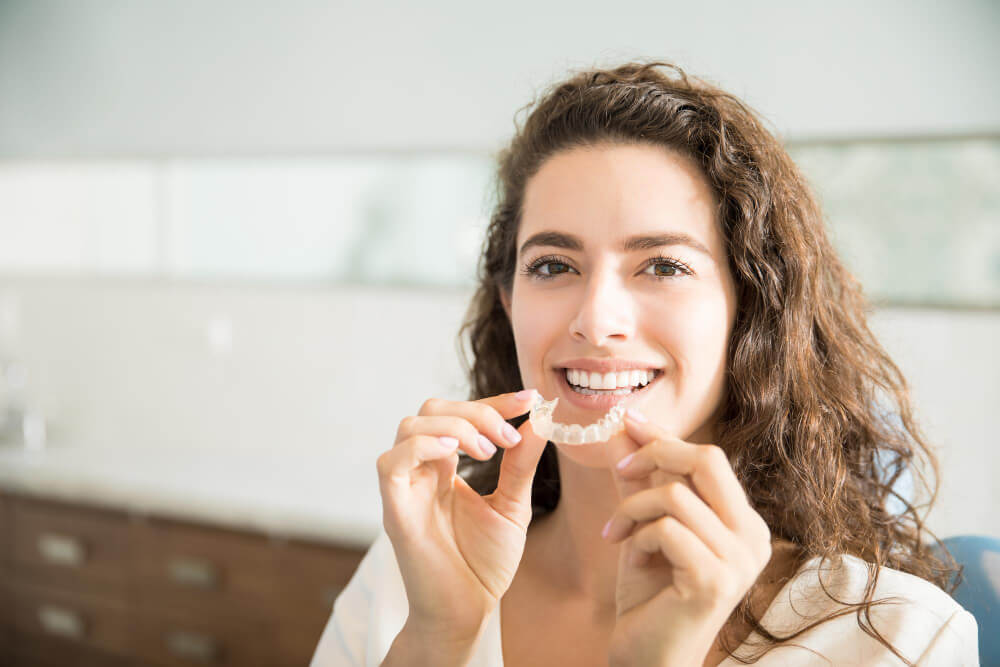
Customization
Opting for a custom-fitted nightguard ensures a precise fit that conforms to the unique shape of your teeth and gums. Customization allows for maximum coverage and protection, as the guard is specifically designed to fit your mouth. Dental professionals take impressions or digital scans of your teeth to create a customized nightguard that offers optimal comfort and effectiveness.
Material
Nightguards are typically made from soft or hard materials, each with advantages. Soft nightguards, usually made of silicone or a soft thermoplastic, provide cushioning and flexibility, making them comfortable to wear. They are suitable for individuals with mild to moderate teeth grinding. A hard nightguard, made of acrylic, offers more excellent durability and can withstand more severe grinding or clenching. They provide a firm barrier between the teeth and are recommended for individuals with severe grinding habits.
Thickness
The thickness of a nightguard can vary, and it impacts both comfort and protection. Thicker nightguards offer more cushioning and absorption of grinding forces, providing greater protection against tooth wear and damage. However, they may feel bulkier in the mouth. Thinner nightguards are less noticeable and may be more comfortable for some individuals, but they may offer less cushioning. Strike a balance between thickness and comfort based on your preferences and the severity of your grinding.
Comfort
Comfort is crucial for a nightguard, as it will be worn during sleep for extended periods. A custom-fitted guard tends to provide the best comfort, as it is designed specifically for your mouth. It should fit securely without causing pain, irritation, or pressure points. Customization ensures that the guard is tailored to your individual needs, leading to better overall comfort.
Breathability
Consider the breathability of the nightguard. It should allow for adequate airflow and breathing during sleep. Look for designs that incorporate perforations or airflow channels to promote proper ventilation. This is particularly important for individuals who may have breathing issues or sleep apnea.
Durability
The nightguard should be durable enough to withstand the forces generated by grinding or clenching. Custom-fitted guards made from high-quality materials are generally more durable and long-lasting. They should be able to withstand nightly use without breaking down or losing their shape. It is essential to select a nightguard that will remain effective over an extended period to protect
What are the Types of Bruxism Mouthguard?
There are three main types of bruxism mouthguard commonly used to manage teeth grinding:
Stock Mouthguard
Stock mouthguards are pre-made and ready to use out of the package. They come in limited sizes and designs and cannot be customized to fit an individual’s mouth. While they are inexpensive and readily available, they often provide a poor fit and limited protection, as they do not conform to the specific shape of the wearer’s teeth.
Boil-and-Bite Mouthguard
Boil-and-bite mouthguards are partially customizable. They are made from a thermoplastic material that softens when boiled. After boiling, the wearer bites into the softened material, allowing it to mold around their teeth and gums. This process enables a better fit compared to a stock mouthguard, but it may still be less precise than a custom-made guard.
Custom-Fitted Mouthguard
Custom-fitted mouthguards are professionally made by a dentist or a dental laboratory. These guards are tailored to fit the individual wearer’s teeth and gums precisely. The dentist takes impressions or digital scans of the teeth to create a custom mold for the mouthguard. Custom-fitted mouthguards offer the best fit, comfort, and protection, as they are specifically designed to match the unique dental structure of the wearer.
When it comes to custom-fitted mouthguards specifically designed for bruxism (teeth grinding and clenching), there are a few variations available.
Here are some common types:
Soft Nightguard:
These mouthguards are made from soft, flexible materials such as silicone or soft thermoplastic. They offer a comfortable fit and provide a cushioning effect, absorbing the force of grinding and protecting the teeth. Soft bruxism nightguards are suitable for individuals with mild to moderate teeth grinding.
Hard Nightguard:
Hard nightguards are made from rigid materials like acrylic. They offer a more durable and firm barrier between the upper and lower teeth, effectively preventing tooth damage caused by grinding or clenching. Hard bruxism nightguards are often recommended for individuals with severe teeth grinding or those who tend to exert significant force.
Dual Laminate Mouthguard:
Dual laminate mouthguards combine a soft inner layer and a hard outer layer. The soft inner layer provides cushioning and absorbs the impact, while the hard outer layer adds durability and protection. This type of mouthguard offers a balance between comfort and effectiveness, making it suitable for individuals with moderate to severe bruxism.
Advantages of Custom-Fitted Mouthguard
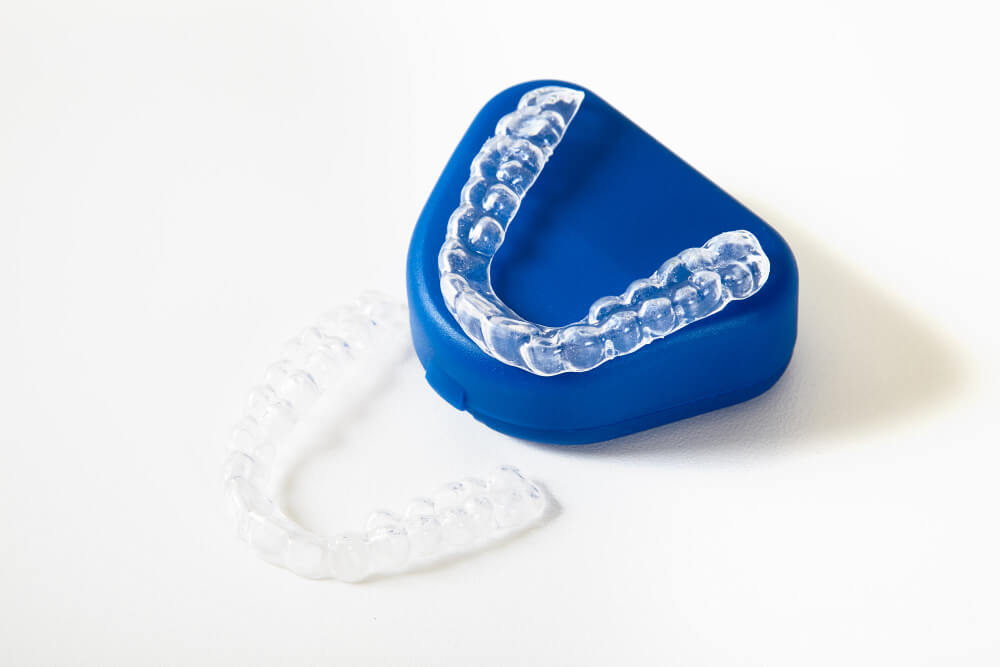
1. Superior Fit
Custom-fitted mouthguards are made specifically for an individual’s mouth. Dental professionals take impressions or digital scans of the teeth, allowing the mouthguard to be custom-made to match the unique contours of the wearer’s teeth and gums. This precise fit ensures optimal coverage and protection, as well as a comfortable fit that feels natural in the mouth.
2. Enhanced Protection
Custom-fitted mouthguards provide superior protection compared to stock or boil-and-bite options. The personalized fit ensures that the mouthguard covers all the teeth adequately, including molars and canines, offering comprehensive protection against impacts, blows, and grinding forces. This helps minimize the risk of dental injuries such as tooth fractures, dislodged teeth, or soft tissue damage to the gums and lips.
3. Optimal Comfort
The customized design of a custom-fitted mouthguard takes into account the unique characteristics of the wearer’s mouth. This results in a comfortable fit that doesn’t impede breathing, speaking, or swallowing. The mouthguard is precisely contoured to the teeth and gums, reducing the risk of irritation or sore spots that can occur with ill-fitting stock or boil-and-bite mouthguard.
4. Improved Performance
Custom-fitted mouthguards are designed to have minimal interference with performance, especially in sports activities. Athletes can speak clearly, breathe naturally, and communicate effectively with teammates while wearing a custom-fitted sports mouthguard. Similarly, individuals with bruxism can experience improved sleep quality and reduced symptoms like jaw pain or headaches, leading to enhanced overall well-being and daily functioning.
5. Longevity and Durability
Custom-fitted mouthguards are typically made from high-quality materials that are specifically chosen for durability and longevity. They are designed to withstand regular use without significant wear and tear. With proper care and maintenance, such as regular cleaning and storage in a protective case, a custom-fitted mouthguard can provide long-lasting protection and value for the wearer.
Where to Get a Custom Bruxism Mouthguard for Teeth Grinding?
To get a custom mouthguard for teeth grinding, you have a few options:
1. Dental Office
The most common and recommended option is to visit a dental office. Dentists and orthodontists can provide custom-fitted mouthguards tailored to your specific needs. They will take impressions of your teeth, send them to a dental laboratory, and have a professional-grade mouthguard created based on those impressions.
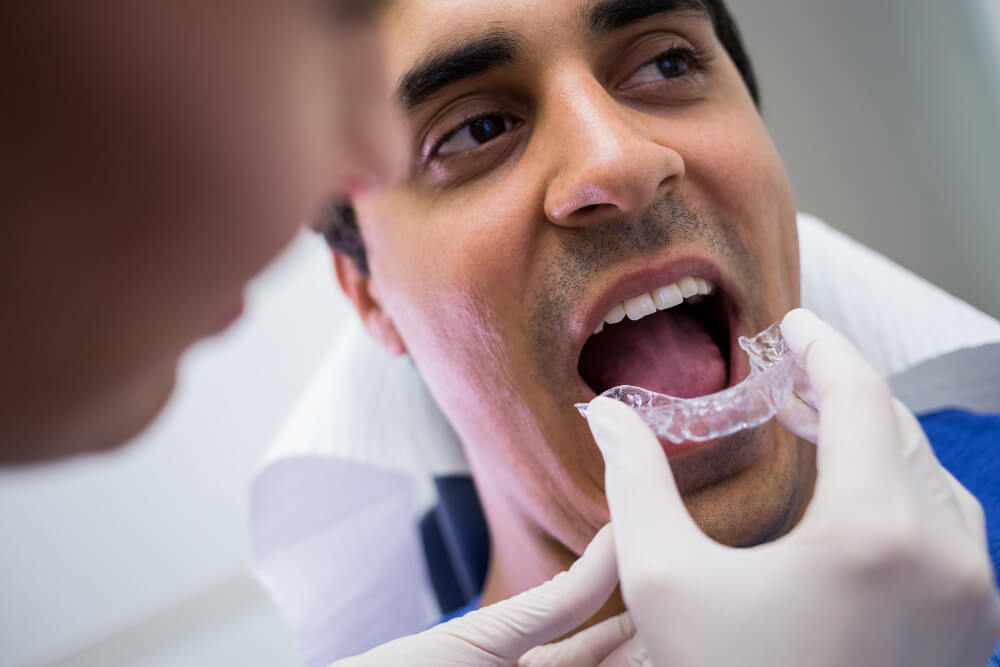
What Steps Dentists Follow to Make Nightguards?
Dentists follow a specific process to make nightguards for their patients. Here are the general steps involved in the creation of a custom-fitted nightguard:
Initial Consultation:
During your initial appointment, you will discuss your symptoms, dental history, and concerns related to teeth grinding or bruxism with the dentist. They will evaluate your teeth and jaw alignment, examine any existing dental work, and determine if a nightguard is suitable for your situation.
Impression Taking:
Once it is determined that a nightguard is appropriate, the dentist will take impressions of your upper and lower teeth. These impressions provide an accurate mold of your teeth, which serves as the basis for creating the custom-fitted nightguard.
Bite Registration:
In addition to the impressions, the dentist will also take a bite registration. This involves having you bite down on a special material to record the relationship between your upper and lower teeth when in a resting position.
Selection of Material:
Based on your specific needs and the dentist’s recommendation, a suitable material will be chosen for your nightguard. Typically, dental-grade materials like acrylic or thermoplastic are used for their durability and comfort.
Laboratory Fabrication:
The dentist will send the impressions, bite registration, and specific instructions to a dental laboratory. Skilled technicians at the lab will use these details to create a custom-fitted nightguard tailored to your mouth. They will carefully craft the guard to match the contours of your teeth and ensure a proper fit.
Fitting and Adjustments:
Once the nightguard is fabricated, you will return to the dentist’s office for a fitting appointment. The dentist will place the nightguard in your mouth and assess its fit, comfort, and effectiveness. They may make minor adjustments if necessary to optimize the fit and ensure proper alignment with your bite.
Instructions for Use and Care:
The dentist will provide detailed instructions on how to wear and care for your nightguard. This typically includes information on when and how long to wear it, proper cleaning techniques, and storage recommendations.
Follow-up Appointments:
The dentist may schedule follow-up appointments to monitor your progress, assess the effectiveness of the nightguard, and make any additional adjustments if needed. These appointments also allow the dentist to address any concerns or questions you may have.
How Much do Bruxism mouthguard Cost from Dentists?
The cost of nightguards from a dentist can vary depending on several factors, including the location, the dentist’s experience and expertise, the type of nightguard, and any additional services or materials involved.
Generally, the cost range for nightguards from a dentist can be as follows:
Basic Nightguards:
Basic nightguards, typically made from acrylic, may range from $300 to $500 per guard.
Custom-Fitted Nightguards:
Custom-fitted nightguards, which provide a more precise fit and greater comfort, can cost between $500 and $1,000 or more per guard. These guards are made from high-quality materials and involve more detailed laboratory work.
Specialized Nightguards:
In some cases, specialized nightguards may be necessary, such as those designed for patients with severe bruxism or temporomandibular joint disorder (TMJ). These guards, which may include additional features or adjustments, can be priced higher, ranging from $1,000 to $2,000 or more.
2. Dental laboratories
Some dental laboratories accept direct orders from individuals. You can inquire with local dental labs to see if they offer the service of creating custom mouthguards. They may require you to visit a dental professional for the initial impressions or may have a process in place for taking impressions on-site.
3. Online Dental Services
Several online dental services provide at-home impression kits for custom mouthguards. They send you a kit with instructions on how to take impressions of your teeth at home. You then send the impressions back to the company, and they create a custom mouthguard based on those impressions. It’s important to choose reputable online services that have positive reviews and a good track record.
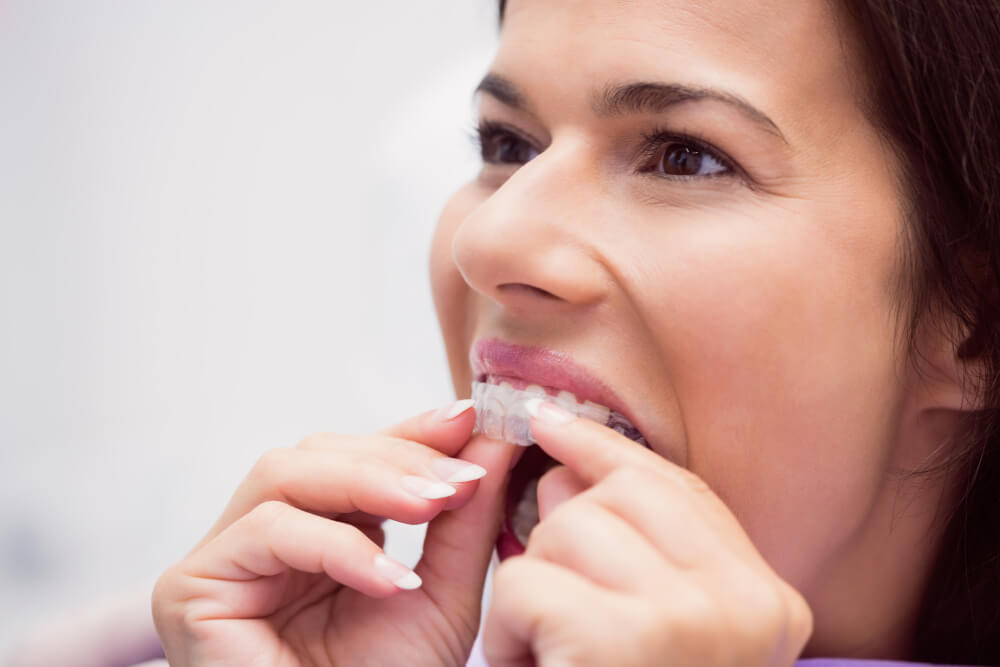
Steps for Ordering Bruxism Mouthguard from Online Dental Services
The steps for ordering a bruxism mouthguard from an online dental service may vary slightly depending on the specific provider, but here is a general outline of the process:
Research and Select a Reputable Online Dental Service:
Look for online dental services that offer custom bruxism mouthguards. Read reviews, check their credentials, and ensure they have positive customer feedback and a reliable reputation.
Visit the Website and Select the Bruxism Mouthguard Option:
Navigate to the online dental service’s website and locate the section or product category for bruxism or teeth grinding mouthguard.
Choose the Type of Mouthguard:
Online dental services typically offer different options for mouthguards, such as custom-fitted mouthguards or “boil-and-bite” mouthguards. Select the type that suits your needs and preferences.
Provide Necessary Information:
Fill out the required information, such as your name, contact details, shipping address, and any specific instructions or preferences you may have regarding the mouthguard.
Place Your Order:
Add the bruxism mouthguard to your cart and proceed to checkout. Review your order details, including the type of mouthguard, quantity, and total cost. Some online dental services may require payment upfront, while others may offer payment options at a later stage.
Receive an Impression Kit:
Once your order is confirmed, the online dental service will send you an impression kit. This kit typically includes materials and instructions for taking impressions of your teeth at home. It may include trays, putty-like impression material, and a prepaid return shipping label.
Take Impressions of Your Teeth:
Follow the provided instructions carefully to take accurate impressions of your upper and lower teeth. Take your time to ensure the impressions are clear and precise, as they will be used to create your custom-fitted mouthguard.
Return the Impressions:
Package the impressions securely and use the provided prepaid shipping label to send them back to the online dental service. Follow the shipping instructions provided to ensure safe and timely delivery.
Fabrication of the Mouthguard:
Once the online dental service receives your impressions, their dental laboratory will use them to create a custom-fitted bruxism mouthguard. Skilled dental technicians will design and fabricate the guard based on the specific measurements of your teeth and bite.
Delivery of the Custom Mouthguard:
Once the fabrication process is complete, the online dental service will ship the custom mouthguard back to you. It should arrive at your designated shipping address within the specified timeframe.
Fitting and Adjustments:
Upon receiving the custom mouthguard, carefully follow the provided instructions on how to properly fit it in your mouth. Some online dental services may offer the option to make adjustments if the fit is not ideal. Contact their customer support for guidance if needed.
How Much Do Nightguards Cost from Online Dental Services?
The cost of nightguards from online dental services can vary depending on the provider, the type of nightguard, and any additional features or services offered. While prices can vary, here are some general cost ranges for nightguards obtained from online dental services:
Basic Nightguards:
Basic nightguards purchased online can range from around $100 to $300. These are typically standard, one-size-fits-all guards that may require some adjustments for a better fit.
Custom-Fitted Nightguards:
Online dental services that offer custom-fitted nightguards often range in price from approximately $200 to $600. These guards are made specifically for your mouth based on the impressions you provide, ensuring a more precise fit and greater comfort.
Specialized Nightguards:
Some online dental services may offer specialized nightguards for specific conditions like severe bruxism or TMJ disorder. These guards may have additional features or adjustments, and their prices can range from around $300 to $800 or more.
It’s important to note that these are estimated price ranges, and actual costs may vary depending on the specific online dental service and the customization options available. Some services may offer different pricing tiers based on the materials used, warranty included, or additional features like teeth alignment or jaw positioning.
Additionally, online dental services may provide the option to purchase additional accessories, such as cleaning solutions or storage cases, which may have separate costs.
3. Sports Stores or Athletic Retailers
While not as precise as a professional custom-fitted mouthguard, some sports stores or athletic retailers may offer boil-and-bite mouthguards specifically designed for sports but can also be used for teeth grinding. These mouthguards can be molded at home by softening them in boiling water and then biting down on them to create a basic fit. They are more affordable but may not offer the same level of comfort and protection as a professionally fitted mouthguard.
How to Clean Bruxism Mouthguard?
Cleaning your nightguard regularly is essential to maintain its hygiene and prolong its lifespan. Here are some steps to effectively clean your nightguard:
Rinse
After removing your nightguard from your mouth in the morning, rinse it under cool or lukewarm water. This helps remove any saliva or loose debris that may have accumulated during the night. Gently swish the water around the guard to ensure thorough rinsing.
Brush
Use a soft-bristled toothbrush specifically designated for cleaning your nightguard. Apply a small amount of non-abrasive toothpaste or mild soap to the brush and gently brush all surfaces of the nightguard. This includes the inside and outside of the guard as well as the areas that come into contact with your teeth and gums. Brushing helps remove any remaining debris, plaque, or bacteria. Be gentle to avoid damaging the guard.
Rinse Again
Once you have finished brushing the nightguard, rinse it thoroughly under running water. Make sure to remove any toothpaste or soap residue, as they can leave a lingering taste or cause irritation if not rinsed properly. Ensure that all cleaning agents are thoroughly washed away before proceeding to the next step.
Soak
Soaking your nightguard periodically helps to ensure a deeper clean and eliminate any lingering bacteria or odors.
There are a few options for soaking solutions:
Denture cleaner:
Use denture-cleaning tablets or a denture-cleaning solution. Follow the instructions on the product for the appropriate dilution ratio and soaking time. Typically, you would dissolve the tablet or add the solution to a container filled with water and soak the nightguard for the specified duration.
Mouthwash:
Use an antiseptic mouthwash to soak your nightguard. Pour enough mouthwash into a container to completely submerge the guard and let it soak for the recommended time. Mouthwash helps kill bacteria and leaves a fresh scent.
Vinegar and Water Solution:
Create a mixture of equal parts white vinegar and water. Place your nightguard in the solution and let it soak for 15-30 minutes. Vinegar is a natural disinfectant and helps eliminate bacteria. Rinse the nightguard thoroughly with water after soaking to remove any vinegar residue.
Dry
After cleaning and soaking, ensure that your nightguard is completely dry before storing it. Moisture can create a breeding ground for bacteria, so it’s important to allow the guard to air dry thoroughly. Place it on a clean towel or use a designated nightguard drying rack. Avoid using towels or tissues that may leave fibers on the guard. Make sure it is completely dry before storing it to maintain cleanliness.
Storage
Store your nightguard in a clean, dry container with proper ventilation. This helps protect it from dust, debris, and potential contamination. Avoid storing it in a sealed container or plastic bag, as it can trap moisture and promote bacterial growth. Choose a container specifically designed for nightguard storage, preferably one with vents to allow for air circulation.
Regular Maintenance
Establish a regular cleaning routine for your nightguard. Clean it daily to prevent the buildup of bacteria, plaque, and odors. Additionally, periodically inspect your nightguard for any signs of wear, cracks, or rough edges. If you notice any changes in the fit or if it becomes uncomfortable, consult your dental professional for guidance on repair or replacement.
Bruxism Mouthguard Side Effects
While bruxism mouthguards are generally considered safe and effective in managing teeth grinding, there are some potential side effects that you should be aware of. These side effects may vary depending on the type of mouthguard and individual factors. Here are some possible side effects:

Temporary Discomfort
When you start wearing a mouthguard, you may experience some initial discomfort, such as soreness or tenderness in the jaw, teeth, or gums. This discomfort typically subsides as your mouth adjusts to the presence of the guard. If the discomfort persists or becomes severe, consult your dental professional.
Difficulty Speaking or Swallowing
Some people may find it slightly challenging to speak or swallow initially when wearing a mouthguard. This is typically temporary and improves as you become accustomed to wearing it. If the difficulty persists or significantly affects your daily activities, consult your dental professional for possible adjustments.
Increased Saliva Production
Wearing a mouthguard may trigger an increase in saliva production, leading to a temporary feeling of excessive saliva in the mouth. This is a normal response to the presence of a foreign object and usually subsides with continued use.
Dry mouth
In some cases, a mouthguard may cause a dry mouth sensation. This can occur if the mouthguard obstructs the flow of saliva or if the individual naturally has reduced saliva production. Maintaining proper oral hygiene, staying hydrated, and using saliva substitutes can help alleviate dry mouth symptoms.
Tooth or Jaw Misalignment
In rare cases, wearing a mouthguard that is not properly fitted or adjusted may cause temporary changes in tooth alignment or bite. This can result in discomfort or changes in the way the teeth fit together. Regular check-ups with your dental professional can help identify and address any alignment issues.
Gag Reflex
Some individuals may experience an increased gag reflex when wearing a mouthguard, particularly if it extends further into the mouth. If the gag reflex is severe or persistent, consult your dental professional for possible modifications to the guard.
Allergic Reactions
Although uncommon, some individuals may be allergic or sensitive to the materials used in the mouthguard, such as latex or certain plastics. If you experience any signs of an allergic reaction, such as itching, rash, or swelling, discontinue use and consult a healthcare professional.
FAQ
Q: What is a Bruxism Mouthguard?
A: A bruxism mouthguard is a dental appliance designed to protect the teeth and alleviate the effects of teeth grinding or clenching, known as bruxism. It is typically worn at night while sleeping to create a cushioning barrier between the upper and lower teeth, reducing the impact of grinding forces and protecting the tooth enamel.
Q: How Does a Bruxism Mouthguard Work?
A: A bruxism mouthguard works by creating a physical barrier between the upper and lower teeth. It absorbs the forces generated during grinding or clenching, preventing direct contact between the teeth and reducing wear and damage. The mouthguard also helps to stabilize the jaw and relax the jaw muscles, reducing muscle tension and relieving associated discomfort.
Q: Why Should I Use a Bruxism Mouthguard?
A: Using a bruxism mouthguard is beneficial for several reasons. It helps protect your teeth from the harmful effects of grinding, such as tooth wear, fractures, and sensitivity. It can also alleviate jaw pain, headaches, and muscle tension associated with bruxism. Additionally, a mouthguard can improve sleep quality by reducing disruptive grinding noises and minimizing the likelihood of sleep disturbances caused by bruxism.
Q: Can I Wear a Bruxism Mouthguard During the Day?
A: Bruxism mouthguards are primarily designed for nighttime use when grinding or clenching most commonly occurs. However, in certain cases, such as daytime bruxism or high-stress situations, a dental professional may recommend wearing a daytime mouthguard. These guards are typically less bulky and more discreet, allowing for comfortable daytime wear while still providing protection.
Q: Are There Different Types of Bruxism Mouthguards?
A: Yes, there are different types of bruxism mouthguards available. The main types include custom-fitted mouthguards, which are professionally made based on impressions of your teeth, and over-the-counter (OTC) boil-and-bite mouthguards, which can be purchased at drugstores and molded to fit your teeth at home. Custom-fitted guards offer a more precise fit and superior comfort, while OTC guards are more affordable but may be less effective and comfortable.
Q: How Long Does a Bruxism Mouthguard Last?
A: The lifespan of a bruxism mouthguard depends on several factors, including the quality of the materials used, the severity of grinding, and how well it is maintained. On average, a well-maintained custom-fitted mouthguard can last between 1 to 5 years. OTC mouthguards may have a shorter lifespan and may need to be replaced more frequently, usually every few months to a year.
Q: How Do I Care for My Bruxism Mouthguard?
A: Proper care and maintenance are important to prolong the life of your bruxism mouthguard. Rinse it with water before and after each use, brush it gently with a soft toothbrush and non-abrasive toothpaste or mild soap, and rinse thoroughly. Avoid using hot water, as it can deform the guard. Store the mouthguard in a clean, dry case when not in use to protect it from damage and bacterial growth. Regularly inspect the guard for signs of wear or damage and consult your dental professional if any issues arise.
Q: Can I Wear a Bruxism Mouthguard if I Have Dental Work (Crowns, Bridges, etc.)?
A: Bruxism mouthguards are generally compatible with dental work such as crowns, bridges, or veneers. However, it is essential to inform your dental professional about any existing dental work before getting a mouthguard. They can guide the most suitable type of mouthguard and ensure proper fit and function without causing damage to your dental restorations.
Q: Do I Need to Visit a Dentist to Get a Bruxism Mouthguard?
A: While some over-the-counter options are available, it is generally recommended to visit a dental professional, such as a dentist or orthodontist, for a properly fitted custom mouthguard. They will take impressions of your teeth to create a customized guard that fits your mouth precisely, offering the best protection and comfort. Professional fitting also allows for any necessary adjustments or modifications based on your specific needs.
Conclusion
In conclusion, nightguards are effective devices for protecting teeth from the damaging effects of bruxism or teeth grinding. Dentists offer custom-fitted guards, ensuring a precise fit and maximum comfort. Online dental services provide more affordable options, though not as personalized. Custom-fitted nightguards are superior due to their tailored fit, durability, and better protection. The cost of nightguards varies based on materials and customization, with in-person dental services generally being more expensive. Regardless of the chosen option, nightguards play a crucial role in safeguarding dental health and preventing further complications caused by bruxism. It’s essential to consult dental professionals to determine the most suitable option for individual needs.
Resources
Image Designed by Freepik
References
https://www.nidcr.nih.gov/health-info/bruxism
https://www.ncbi.nlm.nih.gov/pmc/articles/PMC4761372/
https://newsinhealth.nih.gov/2021/12/taking-teeth-grinding-clenching
https://www.ncbi.nlm.nih.gov/pmc/articles/PMC8890597/
https://www.ncbi.nlm.nih.gov/pmc/articles/PMC5839199/
https://www.mdpi.com/2076-3417/11/20/9363


